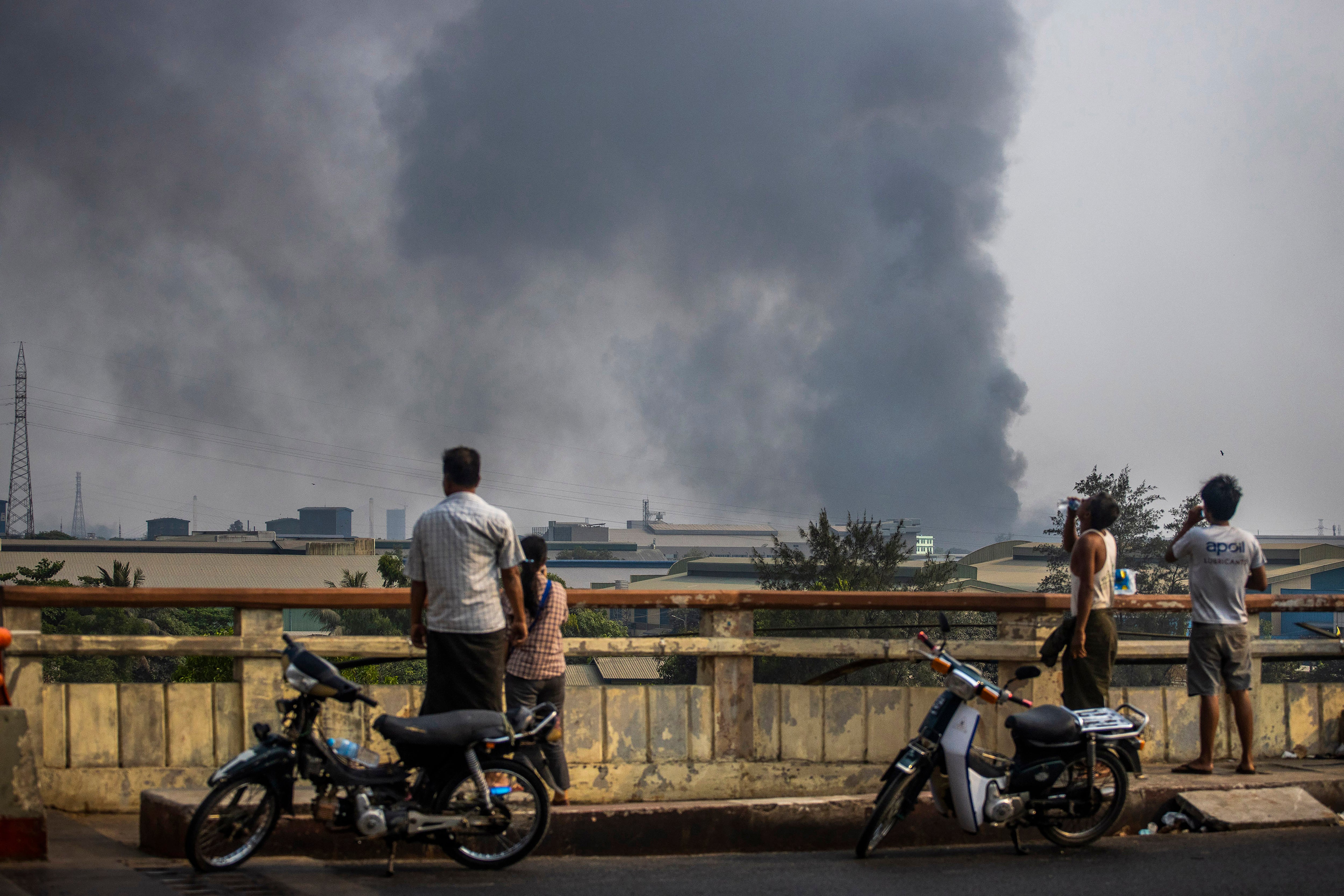Attacks on Chinese-run factories in Myanmar vex Beijing
Attacks on Chinese-run factories in Myanmar’s biggest city have drawn demands from Beijing for protection for their property and employees, while many in Myanmar expressed outrage over China’s apparent lack of concern for those killed in protests against last month's military coup

Your support helps us to tell the story
From reproductive rights to climate change to Big Tech, The Independent is on the ground when the story is developing. Whether it's investigating the financials of Elon Musk's pro-Trump PAC or producing our latest documentary, 'The A Word', which shines a light on the American women fighting for reproductive rights, we know how important it is to parse out the facts from the messaging.
At such a critical moment in US history, we need reporters on the ground. Your donation allows us to keep sending journalists to speak to both sides of the story.
The Independent is trusted by Americans across the entire political spectrum. And unlike many other quality news outlets, we choose not to lock Americans out of our reporting and analysis with paywalls. We believe quality journalism should be available to everyone, paid for by those who can afford it.
Your support makes all the difference.Attacks on Chinese-run factories in Myanmar s biggest city drew demands Monday from Beijing for protection for their property and employees, while many in Myanmar expressed outrage over China's apparent lack of concern for those killed in protests against last month's military coup.
A Chinese Foreign Ministry spokesperson said the Chinese Embassy had contacted authorities in Myanmar and urged that police be deployed to protect the Chinese companies and personnel.
Police and firefighters were sent to protect the factories, which are scattered across several industrial zones in Yangon spokesperson Zhao Lijian told reporters in Beijing. He said China was closely watching and “is very concerned about the impact on the safety of Chinese institutions and personnel."
A statement posted by the Chinese Embassy to Myanmar on Facebook about the efforts to protect Chinese businesses triggered an outpouring of fury in more than 52,000 comments.
“Does it hurt? How about people dying?" said a post from Naing Oo.
“If you want to do business peacefully in Myanmar, respect Myanmar people," said Aye Myat Kyaw. “Stop supporting terrorist army and join Myanmar people."
Many accused Myanmar police or other agitators of causing the destruction to try to incite more trouble.
More than 100 civilians have been killed by security forces since the Feb. 1 coup, according to a tally by the Assistance Association for Political Prisoners. Many more have been injured, and thousands have been arrested.
The attacks on Myanmar’s garment factories have injected an extra complication into an already very complex situation. A fair share of the hundreds of garment factories in Myanmar’s biggest city, Yangon, and other major cities are run by Chinese manufacturers. Most are private companies and many are suppliers to big-name fashion, sports and household goods retailers.
Taiwan South Korea, Hong Kong and Thailand also have a large number of manufacturers running factories in Myanmar that play a crucial role in providing jobs and exports that help keep the economy afloat.
Taiwan's representative office in Yangon recommended that Taiwan-owned companies use Burmese language signs to identify their factories as a “Taiwan Enterprise.” It also advised them to hang Taiwan’s national flag outside and explain to local employees and people living nearby that their factories are Taiwan-run, not from mainland China, to help minimize risks.
Myanmar's military leaders have often chafed at China's outsized influence over their economy. But Beijing's adherence to a policy of non-interference in other countries' politics has already angered many who are protesting the coup that ousted the elected government of Aung San Suu Kyi, with some calling for boycotts of Chinese products.
The protesters have been appealing for support from other countries and the United Nations to restore civilian rule, staging protests and strikes in a massive show of civil disobedience that has nearly paralyzed the economy.
Myanmar state media have reported that martial law was declared in six districts in Yangon, including the major industrial zones of Hlaing Thar Yar and Shwepyitha. At least 38 people were killed Sunday and dozens were injured in one of the deadliest days of the crackdown on anti-coup protesters, according to the Assistance Association for Political Prisoners.
The state-run Myanmar News Agency, which like most other media in the country is not controlled by the military, reported that five factories were set afire in Hlaing Thayar, a factory area to the west of Yangon.
It said protesters had blocked roads, hindering fire engines from reaching the blazes.
One of those named, Global Fashion Garment Factory, is a Chinese-owned supplier to the fashion retailer C&A, according to a list on the C&A website.
___
Associated Press video producer Liu Zheng in Beijing and AP writers Elaine Kurtenbach and Kiko Rosario in Bangkok contributed to this report.